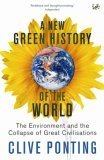

 |

|

The average rating for New Green History of the World based on 2 reviews is 3.5 stars.
Review # 1 was written on 2009-04-27 00:00:00 Lynn Smith Lynn SmithClive Ponting tackles the challenge of telling world history through the lens of environmentalism. The book is informative and interesting, but I found it dry and clinical, with an overemphasis on numbers and percentages. The main thesis of the book is that there were two great transformations in human society (the invention of agriculture and then the predominant use of non-renewable resources and fossil fuels to obtain our energy needs) that have had huge impacts on the environmental degradation of our planet. In the case of agriculture, the use of land for crops led to deforestation, the creation of highly unusable land after too much irrigation led to massive salinization of the soil, and disease as people lived in close quarters with domesticated animals. This also led to a rapid increase in population, urbanization, colonialism, extinction and homogenization of plant and animals, and, led to society as we know it today. The second transformation is much more obvious to those of us living in twenty-first century. We are aware of the environmental and social impacts of relying on non-renewable resources for our energy. (Although I did find it interesting, and totally obvious in retrospect, that even when humans were using renewable resources for fuel, they used them in highly non-renewable ways.) I think the most interesting part of this book was just learning that there never was any sort of golden age in history where there was no pollution, environmental damage being wrought by humans, corruption in huge corporations, etc. Since the dawn of agriculture, humans have pretty much been doing all they can to exploit the planet for maximum gain (although with relatively good intentions - namely to feed, clothe and shelter people). These days we see it in the unstoppable growth of multinational corporations and the ridiculous amounts of profits they obtain from exploiting the resources of the planet. The author also goes into (briefly) the huge impacts of colonialism and how the impacts are still a huge part of our planet these days in terms of which countries are developed, and which segments of the population are rich and poor. I find it sickening how little regard humans have had for other populations as early as the rise of the first societies. At the end of the book, the author mostly just summarizes the main points he made throughout without offering any call to action as most environmental books do. He just states, quite obviously, that future prospects are bleak if we continue to consume as much (although we will most likely keep consuming more) as we do today. A rather bleak outlook, but realistic nonetheless. He holds little hope that there will be any sort of systemic change, as most societies in world history never changed their ways, and inevitably declined as a result. |
Review # 2 was written on 2010-09-02 00:00:00 Richard Osborn Richard OsbornKind of a People's History of the World, but from an environmental perspective. Not as good a writer as Zinn, but readable. It is a hugely informative book if you are interested not only in environmental history, but in the imperialist practices that have left some nations unable to feed or support themselves, while Western nations bask in surplus. |
CAN'T FIND WHAT YOU'RE LOOKING FOR? CLICK HERE!!!